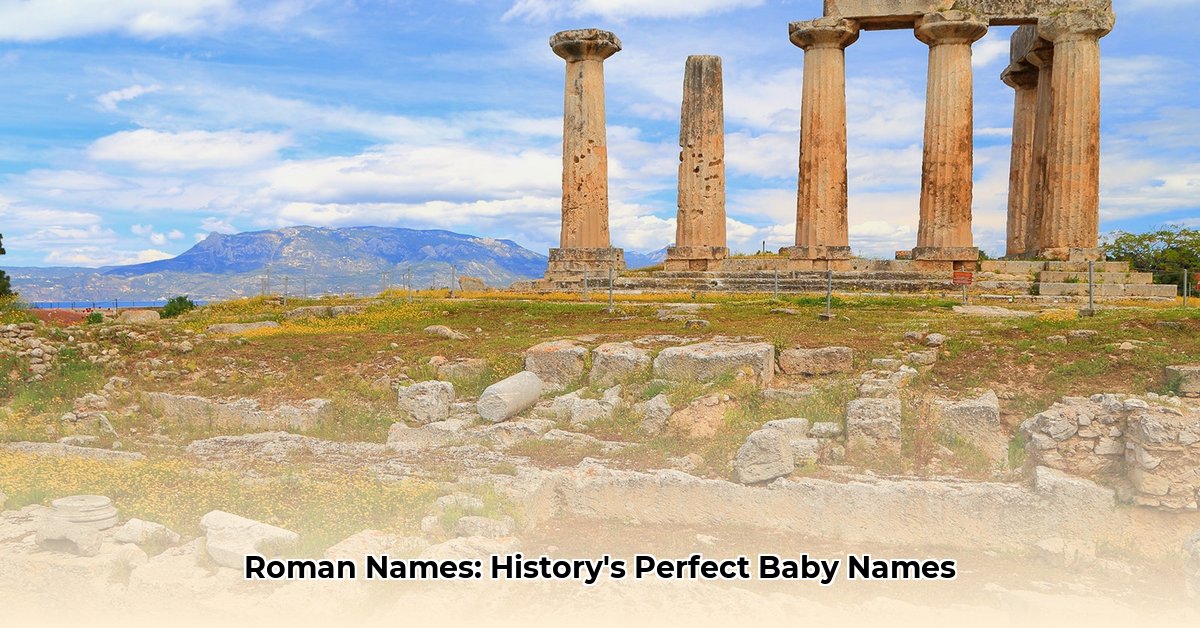Searching for a name with profound historical resonance and enduring strength? Delve into the fascinating world of ancient Roman names for men. Choosing a Roman name is more than selecting a label; it is embracing a rich heritage steeped in tales of emperors, philosophers, and legendary figures. This comprehensive guide embarks on an expedition into Roman naming traditions, uncovering their intricate origins, tracing their evolution through centuries, and exploring why their timeless character is experiencing a compelling revival today. For more on the topic, explore these Roman family names. From appellations inspired by powerful deities to those reflecting coveted virtues and valor, we will uncover the deep significance woven into these classical designations. Prepare to discover how these ancient names continue to resonate powerfully in the modern world.
The Art of Naming: Decoding the Ancient Roman System for Men
Considering a distinctive and meaningful name for your son? Explore the rich heritage of ancient Roman names for men. These names transcend mere labels; they carry significant historical weight, echoing the legacies of influential figures whose stories continue to captivate. Bestowing a Roman name connects your child to a profound and compelling past, offering a sense of enduring strength and nobility. To truly appreciate these choices, understanding the sophisticated Roman approach to naming is essential.
The Tria Nomina: A System of Identity
The Roman method of personal identification was a meticulously structured, three-part system known as the tria nomina (three names). This framework provided a personal identifier, explicitly declared family lineage, and frequently included a distinguishing epithet. This established an individual’s precise standing within Roman society, functioning as a highly effective recognition system for its time.
- Praenomen (Personal Name): This served as the individual’s given name, akin to a modern first name. Despite their prominence, Romans utilized a comparatively small pool of praenomina, with Marcus, Lucius, and Gaius being consistently popular choices. This limited selection contrasted sharply with later European naming customs. Many contemporary male names, surprisingly, owe their existence to these ancient Latin beginnings, often adapted through centuries of linguistic evolution.
- Nomen (Family Name): This vital component identified the gens (clan or extended family) to which a person belonged. It functioned as a surname, unmistakably indicating one’s lineage and broader social connections within the Roman republic and empire. For instance, an individual bearing the nomen Julius was unequivocally a member of the illustrious gens Julia, a clan that boasted significant political and military power, most famously associated with Julius Caesar. These nomina typically ended in “-ius.”
- Cognomen (Distinguishing Name): Originally, these were informal nicknames, frequently derived from physical attributes (e.g., Rufus for “red-haired”), personal characteristics (e.g., Cato for “wise”), or notable achievements (e.g., Africanus for Publius Cornelius Scipio Africanus, victor over Hannibal in Africa). Over time, however, cognomina became hereditary, serving to differentiate various branches within a larger gens, thus preventing confusion among individuals sharing the same praenomen and nomen.
This meticulously structured system ensured clarity regarding an individual’s social position, highlighting the importance of ancestry and personal distinction in Roman culture.
Unearthing the Roots: Where Did Roman Names Originate?
The origins of many ancient Roman names for men are deeply embedded in Latin, Etruscan, or Greek linguistic traditions. Romans frequently drew inspiration from a diverse array of sources when crafting names, leading to a rich tapestry of meanings and associations.
- Mythology: Gods, Goddesses, and Heroes: Names with ties to powerful Roman deities or legendary heroes were highly prevalent. Such naming invoked concepts of strength, divine protection, or a connection to the sacred. Marcus, often linked to Mars, the god of war, exemplifies this, suggesting a “warlike” disposition. Similarly, names like Apollo or Jupiter directly honored the pantheon.
- Virtues: A Reflection of Ideals: Roman society held virtues like wisdom, courage, piety, and justice in high esteem. Consequently, a number of names explicitly embodied these admirable qualities. The name Valerius, for example, derived from valere, signifying “to be strong” or “valorous,” reflecting the Roman ideal of physical and moral strength. Clemens (merciful) and Honorius (honorable) are other prime examples.
- Occupations and Titles: Practical Naming: In certain instances, a name directly denoted a person’s profession, trade, or role within society, offering a highly practical form of identification. Sacerdos referred to a priest, while Centurion was named after a military officer. Even names like Fabius (from faba, “bean”) may have hinted at an ancestral connection to farming.
- Nature: Inspired by the World: The natural environment also contributed to the Roman lexicon of names. Names echoing elements of the natural world, such as rivers, trees, or animals, were not uncommon, showcasing a deep connection to the world around them. Silvanus (of the forest) or Lupus (wolf) exemplify this natural inspiration.
- Colors and Physical Traits: Some cognomina directly described physical characteristics, leading to common names like Rufus (red-haired) or Albus (white/pale). Flavius (golden-haired) is another example that became a prominent family name.
- Place of Origin: Names could also signify a person’s geographical roots. Hadrianus (modern Hadrian) meant “from Hadria,” a town in northern Italy, linking individuals to their ancestral homes.
Understanding these diverse origins provides deeper insight into the intrinsic meaning and cultural significance of each Roman name, making the selection process more informed and meaningful.
Prominent Ancient Roman Names for Men: History and Modern Appeal
Let’s explore some particularly notable ancient Roman names for men, examining their historical context, intrinsic meanings, and their appeal in the contemporary world. This offers a valuable resource for those considering a classic choice.
Timeless Choices with Enduring Power
| Name | Origin | Meaning | Historical Note & Modern Appeal |
|---|---|---|---|
| Marcus | Latin | “Warlike” or “Belonging to Mars” | A widely esteemed praenomen (personal name) and later a nomen, borne by numerous prominent Romans, including Marcus Antonius (Mark Antony) and the philosopher-emperor Marcus Aurelius. It suggests qualities of strength, courage, and leadership, making it a robust and perennially popular choice. It has excellent cross-cultural recognition and retains its classic appeal without sounding dated. |
| Lucius | Latin | “Light” or “Illumination” | This was a very common designation throughout Roman history, appearing in numerous influential families and even borne by three early popes. It possesses a simple elegance and carries a luminous, positive connotation, ideal for a child bringing light into the world. Its sound is sophisticated yet approachable, making it a distinctive alternative to more common “L” names. |
| Gaius | Uncertain | Possibly “To Rejoice” or “Joyful” | Best known as the praenomen of Gaius Julius Caesar, the iconic military and political leader who reshaped the Roman Republic. While its precise pronunciation is still debated (traditionally “Guy-us” but often “Kai-us”), the name strongly evokes associations with power, historical leadership, and classical gravitas. It remains a unique, strong, and distinguished choice for a modern boy. |
| Julius | Latin | “Youthful,” “Downy-bearded,” or “Devoted to Jove” | Forever intertwined with Gaius Julius Caesar, this name is deeply connected to the gens Julia (Julian clan), a distinguished patrician family in Rome. It hints at vigor, historical impact, and an aristocratic lineage. As a classic name, it has maintained popularity across centuries and cultures, offering familiarity while still conveying a sense of historical depth. Names like Julian are popular modern derivatives. |
| Titus | Latin | “Honorable,” “Esteemed,” or “Of the Giants” | Titus was a significant Roman emperor (Titus Flavius Caesar Vespasianus Augustus) who oversaw the completion of the Colosseum. The name also appears in the New Testament and in Shakespearean plays, embodying honor, respect, and dignity. Its short, strong sound makes it impactful and memorable, appealing to parents seeking a distinguished yet less common Roman name. |
| Flavius | Latin | “Golden,” “Yellow-haired,” or “Blonde” | This prominent name is associated with the Flavian dynasty, which included emperors Vespasian, Titus, and Domitian. It symbolizes prosperity, strength, and victory due to its regal connections. Flavius carries a distinctive, warm quality, suggesting radiance and good fortune. While less common today, it offers a sophisticated and unique choice, particularly appealing for those with blonde hair or a desire for a “golden” meaning. |
| Aurelius | Latin | “Golden,” “Gilded,” or “Radiant” | Derived from aureus, meaning golden, this name reached peak prominence with Marcus Aurelius, the philosopher-emperor, linking it to wisdom and enlightenment. It carries a majestic and ethereal quality, suggesting wealth, value, and a luminous aura. Its melodic sound makes it highly appealing, and it has gained significant visibility in recent years, often chosen for its elegant and slightly mystical feel. |
| Cassius | Latin | Possibly “Empty” or “Vain”; or Etruscan origin | A name rooted in antiquity and famously borne by Gaius Cassius Longinus, a key conspirator in Julius Caesar’s assassination. Despite this association, it has a stylish and modern sound, making it a trending choice. It offers a unique alternative to more common “C” names and is often associated with strength and individuality, popularized by figures such as Muhammad Ali (born Cassius Clay). |
| Atticus | Greek/Latin | “From Attica” (region of Greece) | While not strictly Roman in origin (more Greco-Roman), Atticus was adopted by Romans and gained immense fame through Atticus Finch in Harper Lee’s To Kill a Mockingbird, embodying integrity and moral strength. It has become a firm favorite for parents seeking a sophisticated, literary, and noble name. Its “us” ending gives it a pleasing classical sound, and it offers great nickname potential (e.g., Gus, Attie). |
| Maximus | Latin | “Greatest” or “Largest” | A powerful and imposing name that became widely recognized due to the film Gladiator. Maximus was a cognomen often bestowed upon leaders or those who excelled. It encapsulates strength, leadership, and ambition, yet its common diminutive, Max, makes it accessible and friendly. It is an excellent choice for parents who desire a bold, confident name with ancient roots. |
| Cornelius | Latin | Possibly “Horn” | An ancient Roman family name borne by numerous notable figures, including a 3rd-century pope. It carries a distinguished and sophisticated air. While less common than some other Roman names, it offers a classic, multi-syllabic elegance that stands out without being unfamiliar. It has a gentle strength and numerous historical connections that add to its depth. |
Why Are Ancient Roman Names for Men Making a Resurgence?
A fascinating trend reveals many ancient Roman names for men experiencing a notable revival in popularity today. What accounts for this renewed interest in these classic appellations?
- The Allure of History and Grandeur: A significant draw is the inherent gravitas and captivating narratives woven throughout Roman history. These names carry an undeniable sense of timelessness, providing a tangible connection to a formidable civilization that profoundly shaped Western culture. They evoke images of strength, power, and intellectual depth.
- A Strong and Confident Sound: Many Roman names inherently possess a certain robustness and authoritative quality that resonates well with contemporary naming preferences. Their often strong consonants and clear vowel sounds convey a sense of distinction and gravitas, attributes that are highly appealing to parents seeking a commanding name for their child.
- A Unique Yet Familiar Choice: In an era where certain names achieve widespread saturation, opting for a Roman name offers a distinctly unique touch without being completely unfamiliar or esoteric. It effortlessly distinguishes a child from their peers, bestowing upon them a name imbued with genuine historical narrative and a sense of individuality.
- Influence of Popular Culture: Blockbuster films (e.g., Gladiator), acclaimed historical dramas (e.g., Rome, Spartacus), and various forms of media have undeniably played a considerable role. These portrayals actively spark renewed public interest in the classical world, its rich onomastic traditions, and the powerful figures who bore these names.
- The “Old-Fashioned Cool” Factor: There’s a cyclical trend in naming where names that were once common, then fell out of favor, eventually return with a fresh, “vintage cool” appeal. Roman names fit this perfectly, offering a blend of antique charm with a modern sensibility.
Social Fabric Woven in Names: The Evolution of Roman Identity
The intricate Roman naming system provides a profound window into the history of its people, deeply reflecting societal shifts and cultural influences over centuries. Understanding Roman naming conventions is crucial for deciphering their complex social dynamics.
The Dynamics of Cognomina: From Nickname to Legacy
The cognomen, commencing as a simple descriptive appendage for an individual, gradually transformed into an indispensable identifier. Why this evolution? As Roman families expanded and common praenomina and nomina were frequently reused, an additional hereditary element became necessary for differentiation. These distinguishing surnames often marked separate lines within an influential noble house, such as the Cornelii Scipiones (the Scipionic branch of the Cornelian family). Furthermore, an individual could earn an additional, honorary agnomen for outstanding achievements, adding another rare layer of recognition. For example, Gnaeus Pompeius was awarded the agnomen Magnus (“the Great”) for his military prowess.
Gendered Naming: Disparity in Designations
Roman naming conventions presented distinct approaches for boys and girls, starkly illustrating the patriarchal structure of their society. Men were typically accorded the full tria nomina structure, symbolizing their civic and family identity. Women, conversely, were usually identified by the feminine form of their father’s nomen. Thus, a daughter born to a Julius would simply be known as Julia. If multiple sisters existed, they would be differentiated as Major (the Elder) and Minor (the Younger), or sequentially as Prima, Secunda, and so forth (Julia Prima, Julia Secunda, etc.). Later, during the Imperial period, women began to incorporate cognomina as well, though their overall naming system remained distinct and typically less complex than men’s.
The Constitutio Antoniniana: A Naming Revolution
A monumental shift occurred with the Constitutio Antoniniana in 212 CE. This imperial decree extended Roman citizenship to virtually all free inhabitants across the Empire. While seemingly a noble and unifying gesture, it fundamentally altered Roman naming conventions, particularly for men. Suddenly, a vast influx of new citizens adopted the praenomen and nomen of the reigning emperor, Marcus Aurelius Antoninus (Caracalla, whose birth name was Lucius Septimius Bassianus). This dramatically diluted the prior distinctiveness of these names, as many individuals across the empire were now named “Marcus Aurelius.” Consequently, the cognomen became even more critical for reliably telling individuals apart within this expanded citizenry, evolving into the primary identifier.
Freedmen Naming: A Glimpse into Social Mobility
Freed slaves were granted a new identity upon their emancipation. They typically adopted the praenomen and nomen of their former owner, while their original slave name was retained and appended as a cognomen. This practice offers valuable insights into the dynamics of Roman society, particularly concerning social mobility and integration. It visibly documented their transition from servitude to Roman citizenship, reflecting the social structures of the period and the legal framework that governed emancipation.
What Names Reveal: A Historical Lens
The intricate Roman naming system provides a profound window into the history of its people, underscoring why understanding Roman naming conventions is so crucial. Delving into ancient Roman naming patterns allows us to decipher complex family trees, trace instances of social mobility, and monitor the vast expansion of Roman citizenship across its territories. By meticulously studying these customs, historians can gain a clearer, more nuanced understanding of the social structures, demographic trends, and power dynamics that characterized ancient Rome.
Here’s a quick recap of how these elements functioned:
| Name Element | Function | Example | Significance |
|---|---|---|---|
| Praenomen | Personal given name, akin to a first name. Limited common choices. | Marcus, Lucius, Gaius | Unique to the individual, but rarely sufficient for full identification. |
| Nomen | Family or Clan name (gens), indicating lineage. Always ended in “-ius.” | Julius, Cornelius, Fabius | Crucial for identifying one’s broader family and social standing. |
| Cognomen | Originally a nickname, evolved into a hereditary surname. | Caesar, Cicero, Africanus (for Scipio) | Differentiated branches within a gens, often descriptive of traits or achievements. Became more critical after 212 CE. |
| Agnomen | Honorary title for exceptional achievement. | Magnus (for Pompey) | A rare distinction recognizing outstanding military or civic contributions. |
| Constitutio Antoniniana | Imperial decree granting widespread citizenship in 212 CE. | Marcus Aurelius (adopted by new citizens) | Transformed naming patterns by increasing the commonality of imperial praenomina and nomina, elevating the importance of the cognomen. |
| Freedmen Names | Adopted former master’s praenomen and nomen, slave name as cognomen. | Lucius Cornelius Sulla Felix (for Sulla’s freedman) | Documented transition from servitude to citizenship, indicating unique social mobility and legal status. |
So, the next time you encounter a Roman name, remember it represents more than just a label. It embodies a deep and intricately layered history, a reflection of an individual’s place within a complex and formidable empire. By analyzing Roman naming conventions, we can unlock a clearer, more comprehensive understanding of ancient Rome, one name at a time. The system evolved, reflecting societal changes and revealing much about the people who built such a lasting civilization.
Actionable Guide: Choosing the Perfect Roman Name for Your Son Today
Choosing a name deeply rooted in ancient history—a classical Roman name for your son—is a decision that connects him to a powerful and sophisticated legacy. These appellations are experiencing a significant revival, with many parents drawn to their timeless gravitas and unique charm. Here’s an actionable guide to help you select a truly exceptional Roman name, blending historical depth with modern appeal.
Why Choose a Roman Name? Pros and Considerations
When selecting a name deeply rooted in ancient history, it’s beneficial to weigh the distinctive advantages against potential considerations.
| Feature | Pros | Cons |
|---|---|---|
| Historical Depth | Connects the child to a rich, enduring culture, symbolizing profound strength, wisdom, and a grand narrative. Often linked to iconic figures. | Some less common Roman names might occasionally sound unfamiliar or “old-fashioned” to certain listeners, potentially requiring brief explanations or clarifications in modern contexts. |
| Unique Identity | Stands out distinctly from more common names, offering a truly individualized and memorable flair. Fewer children will share the exact name. | Certain Roman names might pose challenges in pronunciation or spelling within some contemporary regions or cultures, leading to occasional mispronunciations or confusion. |
| Meaningful Origin | Often directly linked to esteemed virtues, powerful mythology, or significant historical figures, adding profound depth and aspirational qualities. | The rich historical or etymological context might unfortunately be lost on some individuals, potentially reducing the |










